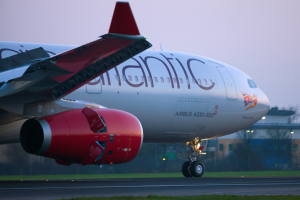Virgin Atlantic signs up HSBC to low carbon fuel intuitive

Virgin Atlantic has announced the UK’s largest bank, HSBC, is joining its exciting partnership with LanzaTech in preparation for a world-first flight using a ground-breaking low carbon fuel.
LanzaTech is developing a revolutionary fuel that sees waste gases from industrial steel production being captured, fermented and then chemically converted for use as jet fuel.
LanzaTech and Virgin Atlantic have been working together for three years on the fuel’s development, but the addition of HSBC’s vital support to the partnership, along with Boeing and other technical partners, means a proving flight of the new technology will take place within the next year.
Virgin Atlantic president Richard Branson, said: “Virgin Atlantic was the first commercial airline to demonstrate the potential of a bio-fuel flight back in 2008 and today we are leading the way again as we work towards cleaner, more sustainable air travel.
“With the support of HSBC, we are investing in the long term, sustainable future of air travel and we are excited about the carbon savings that this technology could help us to achieve, especially when combined with our super fuel efficient new Boeing 787-9 Dreamliners.”
The support of HSBC will allow production of this innovative new fuel to move from sample size to demo scale – and will produce a sufficient amount of fuel to conduct the proving flight.
These are vital steps in the process to achieve American Society for Testing and Materials certification of the alcohol to jet production pathway.
ASTM certification is a significant step towards commercialisation of LanzaTech’s sustainable fuel solution, which is expected to have half the carbon footprint of petroleum jet.
LanzaTech estimates that its process can apply to 65 per cent of the world’s steel mills, allowing the fuel to be scaled up for worldwide use.
It will be a commercially viable option for airlines as it is a ‘drop in’ fuel, requiring no modifications to engine or aircraft technology, and will be produced at a cost comparable to conventional jet fuel.

